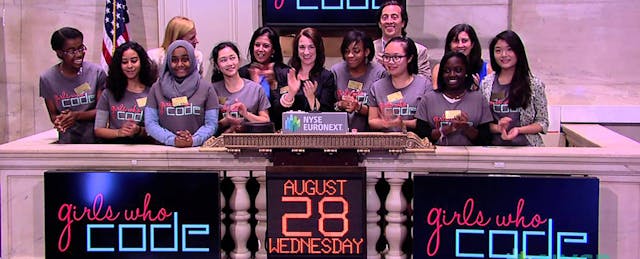Girls Who Code. Black Girls Code. Made With Code. Technovation. Girl Develop It. Girls Teaching Girls to Code.
These are some of the programs and organizations trying to reach gender parity in computer science by introducing girls to programming.
I have been involved with several such organizations. But by far, the one that has most significantly influenced my decision to pursue a career in computer science is Girls Who Code. Let me tell you why.
Find me first—instead of the other way around.
Girls Who Code conducts Summer Immersion Programs in cities around the US, targeting girls who have never coded before. Last summer, I was one of twenty high school girls nationwide invited to participate in a special pilot program for girls with previous programming experience. Like most of the girls there, I had already taken AP Computer Science; however, this experience was radically different from any class I had ever taken.
Give me a mentor—especially someone I can relate to.
The program was held over four weeks at VMware in Palo Alto, California. VMware was a very gracious host. I especially loved the turtle pond, and the amazing dessert and coffee bar featuring new flavors of gelato every day (for a teenage girl, that’s basically heaven).
I had two mentors—both of whom were female VMware software engineers. One was a recent college graduate, and the other had about twenty years of experience; they were both very helpful in answering my questions about their jobs, the companies they had worked for, and their thoughts regarding the future of the industry. From them, I gained a much more comprehensive understanding of computer science as a whole and what it was like to work in high tech.
Introduce me to a variety of concepts—trust me, I’m ready for it!
During the first two weeks of the program, our instructors taught us a variety of languages. We learned JavaScript, Python, and HTML, none of which I had any experience with before. We also listened to presentations by engineers and executives from companies like VMware, Square, Nest, Google, and Facebook. Topics ranged from virtualization to HR to Sheryl Sandberg’s book Lean In (if you haven’t read it, I highly recommend it). We even took a field trip to visit the Intel Museum.
Then, for the final two weeks, we split up into small teams to develop a product. I teamed up with four of my friends, and we decided to develop an iOS app. We debated for a few days before we agreed upon a project – a financial planning and budgeting app for college students.
Nobody in my group had any previous app development experience at all, and none of us knew any of the languages used by Apple. We had to learn Objective C, Swift, and the Xcode development environment before we could even begin to code. Because of our ambitious goals, we decided to utilize open-source software whenever possible; for example, we used Google’s Tesseract open source OCR engine to convert an image of a receipt to text. But for all the important and specific parts, like our algorithms for finding key information from a receipt, we started from scratch, because they were challenging and great opportunities to learn new skills, languages, and software.
Inspire me to work with other girls on coding projects.
Beyond the technical work, we all learned how to work on a computer science project as a team, something that I had never done before; without respecting one another and communicating properly, it would have been impossible. We managed to finish our app in time for our graduation, and plan to launch it to the Apple App Store by the end of December 2015.
For me, Girls Who Code was incredibly helpful. It provided an environment where I felt comfortable enough to produce my best work and showcase my skills. I then applied these skills to a real-world situation, and worked in a group to develop a working app—one that can help college students all over the world with their personal finance. I also found the Girls Who Code network, an amazing community that has become a significant part of my life now and can help me in college and beyond.
If you asked most elementary-school-aged girls what they dream of being when they grow up, what would they say? I hope that one day, the resounding answer is programmers, software developers, and engineers. More and more girls are being introduced to computer science each day, and if they decide to pursue it as a career, there will be people like myself and the Girls Who Code alumni network looking out for them.


